Scottish names are rich with history—whether you are exploring surnames or given names. Evolving from Gaelic, Norse, and Anglo-Norman influences, Scottish names reflect that history. Let’s take a look into the history behind Scottish names and explore some of the most common first names and surnames from Scotland!
The History of Scottish Names
Prehistoric tools found in Scotland appear to date from around 3000 BC! The Romans attempted to invade in AD 79, but they were driven back by the people living in Scotland at the time. Christianity reached Scotland in AD 300, and Vikings came in about AD 800. During this period, Scotland was settled by the Britons, the Picts, the Angles, the Gaels (Scots), and the Norse. This mixture of cultures resulted in a variety of place-names, given names, and naming traditions.
Surnames

In ancient Scotland, the nobility were the first to begin using surnames. It wasn’t long before merchants and townspeople started using surnames as well because it was an easy way to identify each other. However, the process of adopting and adapting surnames took centuries.
Even though surnames started to be used with regularity as early as the 10th or 12th centuries, surnames did not have much consistency until the 16th century, which is helpful to know when you are searching for family records.
The clan system of Scotland can also make surnames confusing. Not every person with the clan surname descended from the clan chieftain. Clans were stronger if they had more people, so people living within the clan borders would join a clan for protection. Some of these people used the clan surname for their families to show their connection with the clan, and sometimes people would join a clan but not use the clan surname. If the land where someone lived was taken over by a different clan, the family might change their surname to the new clan’s surname.
Surnames in the Scottish Highlands and Lowlands differ from each other. The regions were somewhat isolated from one another and differed culturally. Clans were more prevalent in the Highlands and often used surnames beginning with “Mac” or “Mc.” This pattern was less common in the Lowlands.
In 1746, after the Battle of Culloden, many people changed their surnames from clan names to less Gaelic-sounding names so they would not be punished by the British government. If someone’s name was clanlike, he or she could be implicated as disfavoring the crown. But after a few generations, some changed their names back to the clan name.
Naming Patterns
For first names, the Scots had traditional naming patterns. Children were commonly named after other family members. If a child died, parents often gave the next child of the same sex the same name as the deceased child.
Not everyone used this naming pattern or stuck to it faithfully, but it can be fun to look at your family tree and see if your ancestors followed the traditional naming pattern.
| Birth Order of Child | Relative Named After |
| Son 1 | Father’s Father |
| Son 2 | Mother’s Father |
| Son 3 | Father |
| Daughter 1 | Mother’s Mother |
| Daughter 2 | Father’s Mother |
| Daughter 3 | Mother |
Here is an example of a family that closely followed this naming pattern.
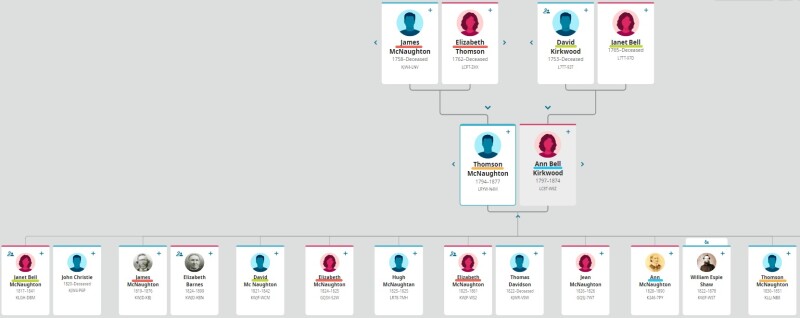
They named their first daughter Janet, after her maternal grandmother. The first son was named James, after the paternal grandfather. The second son was David, after the maternal grandfather. The second daughter was Elizabeth, after the paternal grandmother. She died in infancy, so the name was passed to the third daughter. The third son (Hugh) was not named after any relatives. The fourth daughter, Jean, was named after a maternal aunt (not shown in the image). The fifth daughter, Ann, was named after her mother. The fourth son was named Thomson, after his father. The last two daughters (Lillias and Margaret), who are not shown in the image, were named after maternal aunts. Except for one child, the McNaughtons named all their children after other family members and followed the traditional naming pattern fairly closely.
Scottish Surnames
Scottish surnames are based on many things—occupations, geography, patronymics (based on a person’s father’s name), and descriptions (based on a nickname, hair color, complexion, or so on).
Scottish surnames were often taken from Gaelic Scottish given names, with a “Mc” or “Mac” added to the beginning. This naming convention is patronymic, and the prefix means “son.” For example, the surname “MacDougal” literally means “son of Dougal.” This naming trait was used most often in the Highlands. One in eight surnames in Scotland begins with “Mc” or “Mac,” with one of the most common names being “MacDonald.”
Some surnames were also translated into English. Surnames such as “Mac a' Bhrataich” and “MacGhilledhuinn” were sometimes changed to “Bannerman” and “Brown” or “Broun.”
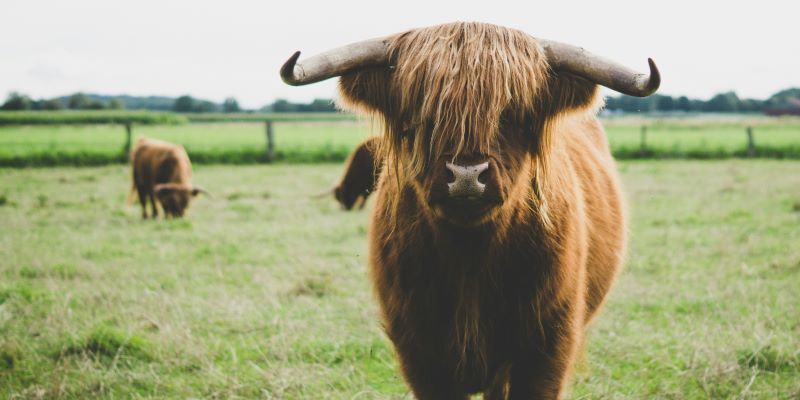
20 Common Scottish Surnames
Surnames can vary based on regions, but below are some of the most common surnames in Scotland.
1. Smith
Origin: Likely a derivative of the Old English word "smītan," meaning "to strike, hammer."
Meaning and History: Smith was an occupational name for people working in metal. Metalworking was one of the earliest specialist professions.
2. Brown
Origin: Represents a translation of the Gaelic word “donn.”
Meaning and History: Brown was generally used as a nickname that referred to the color of an individual's hair or complexion.
3. Wilson
Origin: Wilson was a patronymic name from Middle English, meaning "son of Will."
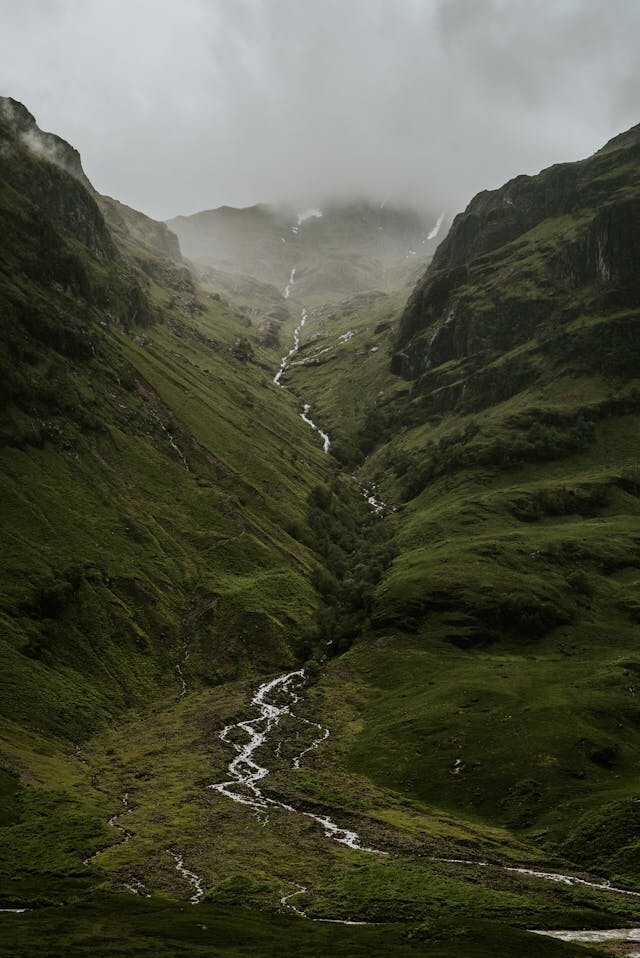
4. Stewart
Origin: Derived from the Middle English “stiward,” and Old English “stigweard,” and “stīweard, a “compound of stig ‘house(hold)’ + weard ‘guardian.’”
Meaning and History: Stewart is an occupational name for an administrative official of an estate. It was the surname of the royal family of Scotland from the 14th century on and was also used as a term for the magistrate appointed by the king to administer land belonging to the British crown.
5. Thompson
Origin: Thompson is a patronymic name from Middle English, meaning "son of Tom."
6. Robertson
Origin: A patronymic name from Middle English.
Meaning and History: The personal name Robert has been particularly popular throughout Ancient Scottish history, being the name of three kings of Scotland. Robertson was the name given to the son of Robert.
7. Campbell
Origin: Campbell is derived from the Gaelic nickname “Cam.”
Meaning and History: “Cam” meant “crooked” or “bent,” and “beul” translated as "mouth." This combination suggests that the name was perhaps given to people who were dishonest or disliked.
8. Anderson
Origin: Anderson is a patronymic name, meaning “son of Anders,” from Middle English.
Meaning and History: Anders is the Scandinavian form of Andrew. This name is very popular in Scotland because of the patron saint of Scotland, which is Saint Andrew.
9. Murray
Origin: Derived from Celtic language, “mori” + “treb,” meaning “sea settlement.”
Meaning and History: Murray is a habitational name common for people from Moray, in northeastern Scotland. Hence the Celtic translation—Moray is an area on the coast of Scotland.
10. MacDonald
Origin: MacDonald is the anglicized form of the Gaelic name “Mac Domhnail.”
Meaning and History: “Domhnail” is a name that comes from Celtic translations for “world” and “rule.”

11. Taylor
Origin: Derived from Anglo-Norman French, Middle English, and Old French terms, which roughly mean “to cut.”
Meaning and History: Taylor is the occupational surname for a tailor.
12. Scott
Origin: Scott is a habitational and ethnic name from the Middle English term “Scot.”
Meaning and History: “Scot” translates to “man from Scotland.” It makes sense that it is popular in Scotland! While there have been other uses of the word “scot,” such as a term used to describe a “Gaelic-speaking Irishman,” no evidence suggests that this meaning relates to the name.
13. Reid
Origin: A variation of the name “Reed.”
Meaning and History: Reid is a nickname from Middle English and Old Scots for “red,” denoting someone with red hair or someone with a healthy-looking red complexion.
14. Clark
Origin: From the Middle English “clerk,” Clark means clerk, cleric, or writer.
Meaning and History: The term is thought to have come from religious origins. All writing and secretarial work in Medieval Christian Europe was typically carried out by members of the clergy, hence the term “clerk.” These members of the clergy were permitted to marry, and the surname became established over time.
15. Young
Origin: From the English equivalent of the Gaelic nickname “Og,” which translates as “Young.”
Meaning and History: As the name suggests, it was originally used to distinguish a younger man from an older man with the same personal name. This usage was most common between father and son.
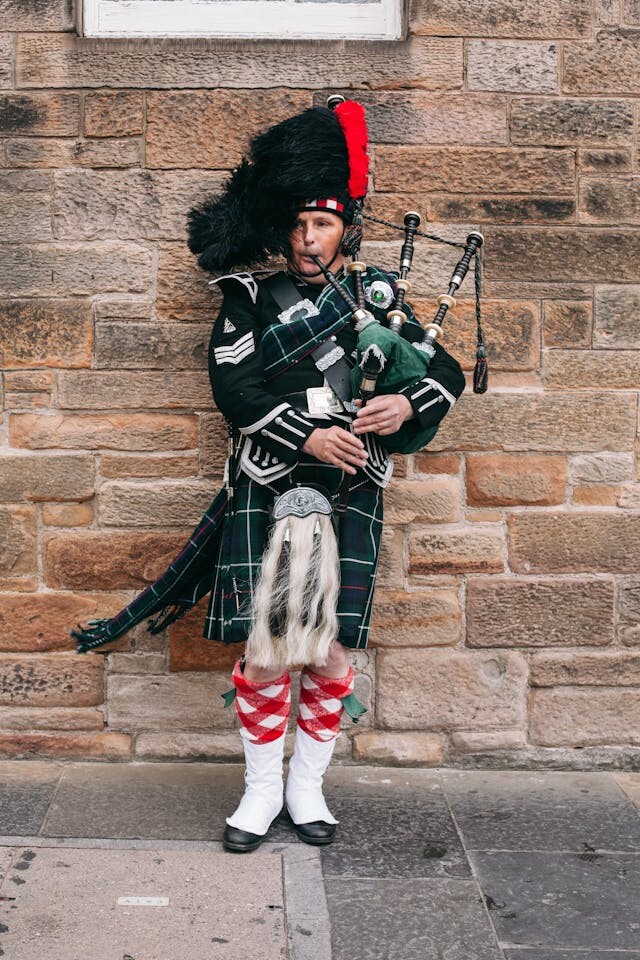
16. Morrison
Origin: A patronymic name from Middle English.
Meaning and History: From the Gaelic “Mac Moireasdain,” Morrison was used for the sons of individuals named “Moireasdain,” or “Morris.”
17. Walker
Origin: An occupational name for a fuller.
Meaning and History: The name is derived from the Middle English “Walker,” and the Old English “wealcere,” which roughly means “walk” or “tread.” This word was used in the context of fulling, a process in the creation of woolen products, and it was a name for people who walked on cloth to strengthen it for pleating.
18. Ross
Origin: Ross is a habitational surname from the province of Ross, in northern Scotland.
Meaning and History: The name was introduced to Scotland when Robert of Roos married the daughter of the king of Scots, William the Lion.
19. Watson
Origin: Watson is a patronymic name given to the “son of Wat.”
Meaning and History: Wat was a pet form of the name “Walter.” It is a common nickname given in Scotland and northern England.
20. Graham
Origin: Graham is a habitational surname for people from Grantham, in Lincolnshire, England.
Meaning and History: The name was introduced to Scotland in the early 12th century by the Norman Baron William de Graham, who was the holder of the manor of Grantham in Lincolnshire. Most bearers of the name likely descend from this family or were associated with this family.
15 Scottish Boy Names

Many Scottish given names are of Gaelic origin, and many are intertwined with Irish origins as well.
Here is a list of popular Scottish boy names and their meanings:
1. Adair
Meaning: oak grove

2. Alastair
Meaning: Scottish Gaelic form of Alexander (which means “defender”)
3. Angus
Meaning: unique choice
4. Baldwin
Meaning: bold friend
5. Callum
Meaning: dove
6. Cameron
Meaning: crooked nose
7. Donald
Meaning: world mighty (from Irish Gaelic “Domhnall”)
8. Duncan
Meaning: dark or brown warrior; from Gaelic “dun” (brown) and “chadh” (warrior)
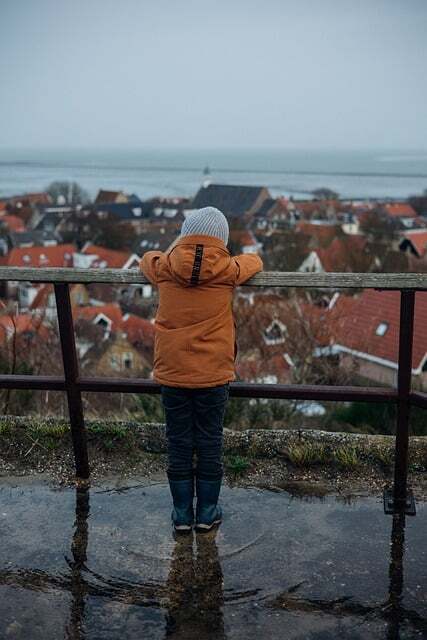
9. Gavin
Meaning: white hawk, hawk man
10. Graham
Meaning: gravel home; from the Old English “grand” (meaning “gravel”) and "ham" (meaning “home”)
11. Hamish
Meaning: one who supplants; Gaelic form of James
12. Muir
Meaning: sea warrior
13. Rory
Meaning: red king; from Gaelic “ruadh” (red) and “ri” (king)
14. Stuart
Meaning: steward or animal warden; from Gaelic “stiweard”
15. Tamhas
Meaning: twin; Gaelic form of Thomas
15 Scottish Girl Names
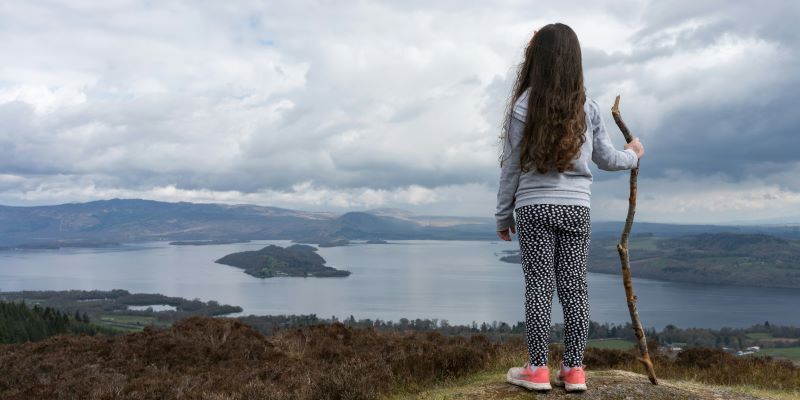
Scottish variants of English names are common in Scotland. For example, for Elizabeth, Elspeth might be used, or Catrina, Caitriona, or Ceitedh might be used for Katherine.
To feminize a name traditionally used for males, the suffix “ina” would be added. Often, girls would have the nickname “Ina.”
Here is a list of common Scottish girl names and their meanings:
1. Agnes
Meaning: chaste, holy

2. Aileen
Meaning: rays of sunshine; from Gaelic “Eilidh”
3. Ainslie
Meaning: hermitage meadow
4. Bridget
Meaning: power strength; the name of a Celtic goddess
5. Catriona
Meaning: pure; Scottish Gaelic form of Catherine
6. Elspeth
Meaning: God is my oath; Scottish variant of Elizabeth
7. Fiona
Meaning: fair one, white
8. Hilda
Meaning: woman of battle
9. Gavina
Meaning: white hawk, hawk woman; feminine form of Gavin

10. Greer
Meaning: watchful, vigilant
11. Innis
Meaning: island
12. Margaret
Meaning: precious, pearl
13. Morag
Meaning: princess; Scottish version of Sarah
14. Rhona
Meaning: wise ruler
15. Sorcha
Meaning: radiant
Do You Have Ancestors from Scotland?
With a free FamilySearch account, you can use the Where Am I From experience to see the birth countries of all your ancestors who are in the shared family tree.
If you click the My Heritage tab, you can see which countries many of your ancestors were born in. Maybe you have more ancestors from Scotland than you thought you did!
Discover More About Your Scottish Heritage
At FamilySearch, we care about connecting you with your family, and we provide fun discovery experiences and family history services for free. Why? Because we cherish families and believe that connecting generations can improve our lives now and forever. We are a nonprofit organization sponsored by The Church of Jesus Christ of Latter-day Saints. To learn more about our beliefs, click here.





